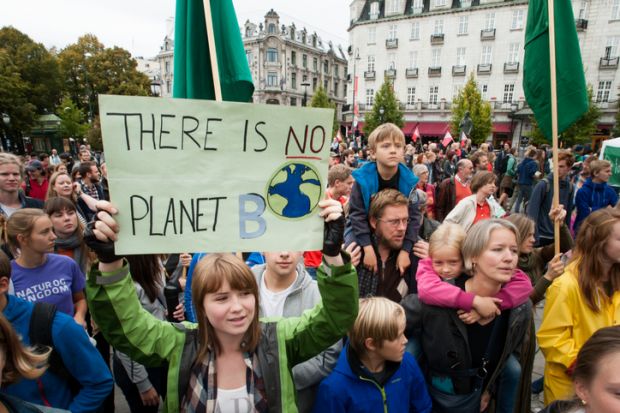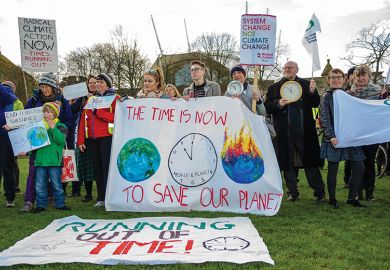The world is burning. Wildfires and dramatic shifts in climate are laying waste to croplands and communities, while water resources dwindle. Age-old environmental norms lose their relevance and are abandoned, as our assumptions of stability and permanence collapse. Is this the scenario for an apocalyptic Hollywood blockbuster – or just the evening news? It is increasingly hard to tell.
This slender volume by Mark Bould – part memoir, part essay, part call to arms – catalogues the impact of humanity on our home planet as captured in popular culture. The end of the world is a broad canvas, and we are treated to a wild ride across a range of genres from the familiar to the gloriously obscure. I hadn’t, for example, previously read a critique that includes both the science fiction novels of Arthur C. Clarke, stolidly based on linear engineering, and the increasingly bizarre premises on which the Sharknado series of cult horror films is forced to lurch forward.
Embedded within this marketplace of cultures, the destruction wrought by human activity runs like a branching stream of both background action and elements deeply bound to the main storyline. For the pulp feature producer of today, mountains of found footage showing real disasters offer a low-budget mechanism for entraining real horror within the fake storyline – creating a morally ambiguous mash-up.
As the author cannot realistically assume that his audience has encountered all the sources referred to, he includes a series of engaging thumbnail sketches to bring us up to speed. These have the endearing flavour of sitting with your friends in the pub, shortly after the second pint, briefly explaining the film you saw last night – and that is a good thing.
By encompassing both mainstream and niche media, the text amply demonstrates the increasing crossover between fictional environmental horror and the current rash of eco-documentary material that is painful to watch and deeply troubling. Our obsession with high-consumption lifestyles and rampant technology, as exemplified by the Fast & Furious franchise, bears comic-book witness to our lack of perception and vision around the issues of environmental destruction.
The narrative is, by turns, wildly enthusiastic and cheerfully irreverent – which helps reinforce the active nature of the prose. At one level, the text could be seen as a vision from the future, a retrospective analysis of our present situation, a requiem for a world we have already lost. This is a deeply personal missive – and one that carries a powerful message: we conflate the fact and fiction of global destruction at our peril.
One aspect of the discussion may both reassure and chill the reader: while we may call the potential destruction of humanity through environmental degradation “the end of the world”, at a planetary scale the loss of our species would be almost an irrelevance. In all but the darkest of scenarios, the planet itself would endure – and as time healed Earth’s wounds, little would be left to mark our passing.
John Gilbey teaches at Aberystwyth University. He has published more than 25 science-fiction stories.
The Anthropocene Unconscious: Climate, Catastrophe, Culture
By Mark Bould
Verso, 176pp, £12.99
ISBN 9781839760471
Published 2 November 2021
POSTSCRIPT:
Print headline: Future horror or apocalypse now
Register to continue
Why register?
- Registration is free and only takes a moment
- Once registered, you can read 3 articles a month
- Sign up for our newsletter
Subscribe
Or subscribe for unlimited access to:
- Unlimited access to news, views, insights & reviews
- Digital editions
- Digital access to THE’s university and college rankings analysis
Already registered or a current subscriber?








